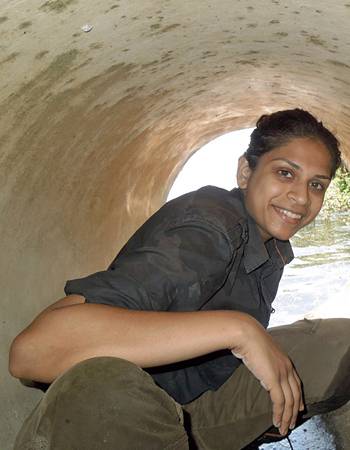Keerthi Krutha
Young Naturalist Award (2014)
Keerthi Krutha Encouraged by a far-sighted family, she was a part and parcel of Kids for Tigers, the Sanctuary Tiger Programme and was selected to be a National Tiger Ambassador way back in 2004. Since then her intellectual growth and her resolve to bring science to bear on the protection of nature has grown ever stronger. Today Keerthi has evolved from a young girl who loved all forms of life, to a focussed woman whose priority is to contribute to the conservation of reptiles and amphibians. After finishing school, Keerthi obtained a bachelors degree in Plant Biotechnology, while continuing to keep her boots well-muddied by rescuing snakes, volunteering at the Madras Crocodile Bank, participating in wildlife estimations, and organising Earth Hour campaigns. Post her graduation in 2012, Keerthi snapped up the opportunity to work on a project to characterise the amphibian chytrid fungus in the Western Ghats, under the aegis of the Wildlife Information Liaison Development Society (WILD) and the Zoo Outreach Organisation (ZOO), Coimbatore.
She has spent the past two years undertaking fieldwork in 39 Protected Areas and 19 other sites within the Western Ghats landscape. Using a non-destructive protocol, she has collected skin swabs from as many as 2,000 amphibians. Through molecular analysis carried out at the Indian Institute of Science Education and Research at Pune, she and her team were able to confirm that this particular chytrid fungal strain is a widely distributed Asian endemic strain. These findings were published in the prestigious journal PLoSOne. Subsequently, Keerthi received two research grants from the Mohamed bin Zayed Species Conservation Fund, which served to fuel her drive and enabled her to move even faster in her chosen direction.
Hardy in the field and meticulous in the lab, Keerthi has trudged through kilometres of wild habitats, from leech-laden shola grasslands to tick-infested, dry deciduous forests, while broadening her own understanding of India’s conservation scenario through interaction with local tribals, bureaucrats, IT professionals and scientists.
Fuelled by an insatiable curiosity, this young woman is a role model for children, especially young girls eager to spread their wings and opt for ‘unconventional’ careers. She reasons that sound scientific backing is critical to the protection of wildlife, and seeks to fill some of the vast data gaps in terms of undiscovered species, taxonomic ambiguities, unexplored areas and infectious diseases. This will surely keep her busy for years as she helps build a stronger, more rational and nature-sensitive India.
For this, we honour her.


